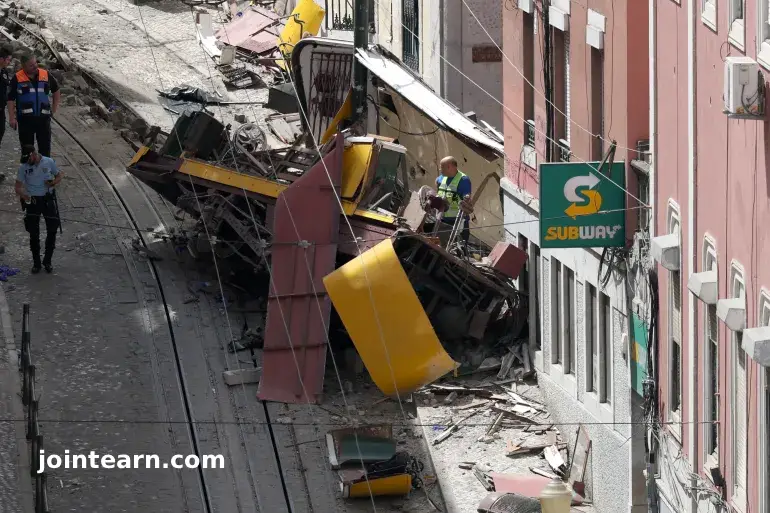
Lisbon, Portugal – October 20, 2025 — A Portuguese government inquiry has recommended that Lisbon’s historic funicular trams remain closed indefinitely after investigators found that a faulty cable caused the tragic September 3 crash that killed 16 people and injured 20 others. The decision deals a blow to the city’s tourism sector, which relies heavily on the iconic Gloria funicular—a 19th-century landmark known for connecting Lisbon’s steep hillside neighborhoods.
Inquiry Reveals Faulty Cable as Cause of Deadly Accident
According to the GPIAAF (Gabinete de Prevenção e Investigação de Acidentes com Aeronaves e de Ferrovia)—Portugal’s air and rail accident investigations bureau—the crash occurred when a cable linking two cabins disconnected, sending one of the trams hurtling downhill before it derailed and crashed into a building near Restauradores Square.
The GPIAAF’s preliminary findings determined that the cable used on the Gloria line “did not comply with the technical specifications” established by the city’s transport operator, Carris de Ferro de Lisboa (CCFL). Although the funicular’s driver reportedly activated the braking system, the brakes failed to stop the car’s descent once the cable snapped.
“Our analysis indicates a clear failure in compliance and safety verification procedures,” said a spokesperson for the GPIAAF. “Until the integrity of all systems can be confirmed, Lisbon’s funiculars must remain closed to protect passengers and operators.”
Sixteen Dead, Including 11 Foreign Tourists
The accident claimed the lives of five Portuguese citizens and 11 foreign tourists, including three from the United Kingdom, two Canadians, two South Koreans, one American, one Frenchwoman, one Swiss, and one Ukrainian. The tragedy shocked both locals and international visitors, sparking widespread calls for accountability and enhanced safety oversight.
Emergency responders described the scene as “chaotic,” with the funicular car partially crumpled and lying on its side. The derailment occurred at approximately 6:15pm local time (17:15 GMT) on one of Lisbon’s steepest slopes, an area typically crowded with visitors photographing the city’s colorful streetcars and panoramic views.
Lisbon’s Other Funiculars Under Review
In response to the findings, the inquiry recommends that all of Lisbon’s other funicular tram systems, including the Bica and Lavra lines, remain closed until further notice. Inspectors will now conduct extensive checks on their braking mechanisms and counterweight systems to verify that the trams can immobilize safely in the event of a cable break.
While the GPIAAF’s final report is not expected until 2026, the bureau emphasized that no funicular should resume operation until new safety certifications are issued. Lisbon’s municipal authorities have pledged full cooperation with investigators and said they are considering modernizing the mechanical systems of the trams while preserving their heritage design.
Historic Symbol Faces Uncertain Future
Opened in 1885, the Gloria funicular is one of Lisbon’s oldest and most beloved landmarks, connecting Praça dos Restauradores with the Bairro Alto district. It operates on a counterweight system, in which one car ascends as another descends. When the connecting cable failed last month, the mechanism’s balance was lost, transforming the descending carriage into a runaway vehicle.
The closure of the funiculars has already affected local businesses that rely on tourist traffic. Cafés, souvenir shops, and walking tour operators in the area have reported sharp declines in visitors since the September crash.
“The Gloria tram isn’t just transport—it’s part of our identity,” said Rita Almeida, owner of a nearby café. “But safety must come first. We just hope the government moves quickly to fix the problem.”
Next Steps and Safety Overhaul
The GPIAAF will now focus on determining the full chain of responsibility, including potential lapses in maintenance oversight, contractor compliance, and quality control. Officials have hinted that criminal negligence charges may follow if evidence shows regulatory violations or falsified safety reports.
Transportation Minister João Galamba said that the government will “ensure every inch of cable and brake system is tested before a single tram moves again.” The ministry also announced plans to implement digital monitoring sensors on all Lisbon funiculars to detect real-time anomalies in tension or braking resistance.
A City in Mourning and Transition
Public memorials for the victims continue to take place across Lisbon, with flowers and candles still lining the tracks near the site of the crash. As the investigation deepens, both residents and tourists await clarity on when—and how—these beloved symbols of Lisbon’s charm will safely return to service.
Until then, the Gloria, Bica, and Lavra lines will remain motionless, serving as a somber reminder of a tragedy that reshaped Portugal’s approach to transportation safety.


Leave a Reply